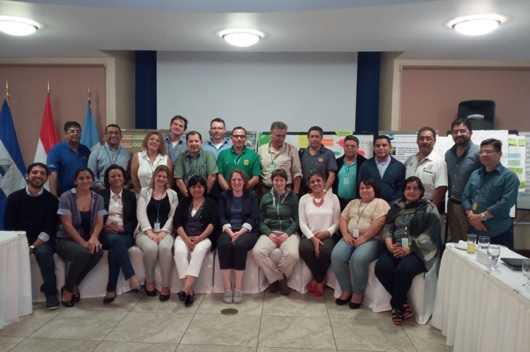TEGUCIGALPA, Honduras – The Sector Partnership (SP) Inception Workshop organized by UTZ was held in Tegucigalpa, Honduras with 11 representatives of civil society and governmental organizations.
During three days, attendees had the opportunity to learn UTZ’s vision and the requirements of the program that includes six topics: productivity; climate change; eradication of child labor; gender; living wage; strengthening of farmer groups and smallholders and women inclusion.
As part of the methodology, UTZ officers explained the Theory of Change to identify problems; causes and effects; multi-sector lobbing and advocacy; and, monitoring and evaluation plans for adjustments and continuous improvement.
Among the organizations that have started or that are about to begin projects with the Sector Partnership Program are: Fundasistemas, Fundaeco and the Guatemalan Ministry of Agriculture; AHPROCAFÉ, IHCAFÉ and El Zamorano; Molinos de Honduras in coordination with Cocafelol, all located in Honduras, and Soil and More located in Holland; FUNICA, Café Nica, NICAFRANCE, Sopexca/Prodecoop from Nicaragua in coordination with the Coffee Quality Institute (CQI), located United States; Global Coffee Platform that will support specific topics in these countries.
Each organization presented their project, identified problems, expected results and their plans for monitoring and evaluation.
According to Laurens Von Oeigen, UTZ’s Sector Partnership Director, the workshop was useful to “learn about the regional and country needs and collaboration in sustainability topics.
Partners not only appreciated the funding but the opportunity to think beyond their own projects, at the national and regional level”.
This was the case for all the topics of the projects: developing a coffee curricula; farm visit knowledge-exchange and successful experiences about carbon dioxide capture; weather stations; development of resistant varieties; strengthening of coffee schools, living wage; and, women entrepreneurship.
Von Oigen stated that project leaders showed energy for interchange and collaboration in different specialized topics. “In each country, there is an appropriation of topics between UTZ and the different partners that can be expanded with the participation of Global Coffee Platform that we also support”.
The partners
As Leonel Hilario Guevara, Director of the Higher Education Honduran Institute of IHCAFE, in coordination with El Zamorano, indicated the coffee curricula they will develop “with UTZ funding will educate young professionals, students, technicians and coffee promoters of the Honduran coffee sector”.
Douglas Alvarado, from the Cooperative and Entrepreneurship Division of AHPROCAFE (the biggest coffee growers membership guild of Honduras), explained that they will offer training programs for 270 leaders of rural groups and coffee farms; 210 young professionals and children of coffee growers annually for three years; as well as, develop a web page for the association with an estimate reach of 3,000 people by year.
On the other hand, Lizandro Borjas, Director of the Nicaraguan Coffee School, expressed that their project “aims to strengthen our school and benefit coffee growers of both genders in productivity and quality coffee”. They partnered with FUNICA, non-government organization.
“This initiative requires collaboration of both private and public sectors”, Oswaldo López, Director of FUNICA, said. At the same time, this project could also take advantage of the Honduran project experienced described above.
In climate change, Teresa Ruiz, Community Development Director of NICAFRANCE, explained “our project with UTZ will contribute to strengthening the areas we are already working with nearby communities of La Cumplida farm, such as: living wage, small coffee growers development and support to better address and adapt to climate change effects”.
Marta Estela Gutiérrez, Executive Director of CaféNica, indicated, “the main contribution of our project is resilience to climate change of small coffee growers and their nearby communities through better information systems”. They partnered with the International Center for Tropical Agriculture (CIAT by its Spanish meaning).
Meanwhile, Edgar Ramírez from the Sanitary Plant Direction and Epidemiology Vigilance of MAGAGuatemala said their funding would train and educate professionals working in this area.
“We have planned three training courses: the first one will teach us about UTZ and how we will be working nationally; the second course will address interpretation of early warning systems that we already work with FAO; and the last one, will be about climate change and proper adaptation”, he commented.
Fundaeco will also start a project on climate change with communities of coffee growers around the San Isidro Private Reserve, located in Barillas municipality in the department of Huehuetenango, in Guatemala.
“The project seeks to facilitate coordination among different actors, lobbing and advocacy actions to better support small and medium coffee growers; as well as, to create field experiences related to climate change”, indicated Ingrid Arias.
Ottoniel Gamboa, of Fundasistemas, explained that his organization has “the responsibility to work and advocate with MAGA for the application of the methodology that will be used to educate small coffee growers on how to develop entrepreneurship capabilities”.
The Holland Company, based in Germany, Soil and More develops a project about soil conservation in coordination with Honduran exporter Molinos Modernos and Cocafelol cooperative.
This partnership works on diagnosis, soil analysis, pilot tests and recommendations. But also covers the commercialization of the products so that the growers can see financial benefits.
Kimbelry Easson, Gender Equity Program Coordinator of CQI, during her project presentation together with Soppexcca and Prodecoop from Nicaragua, emphasized, “The word gender includes all of us. Gender is all of us”. Thus, when talking about gender the leaders need to consider all the family members needs in order to advance significantly.
“When the family works in collaboration, there is a greater impact in all other levels of the coffee chain”, she commented when explaining the objectives of their project.
At the end of the workshop, UTZ’s Theory of Change applied in each country was discussed in order to adjust and make changes, allowing projects to better implement and achieve results.
Attendees also had the opportunity to work in groups to discuss lobbing and advocacy in the main SP working topics in the region: gender, climate change and development and improvement of coffee curricula for the region.
For more information about the Sector Partnership Alliance visit www.utz.org/what-we-offer/sector-change.















